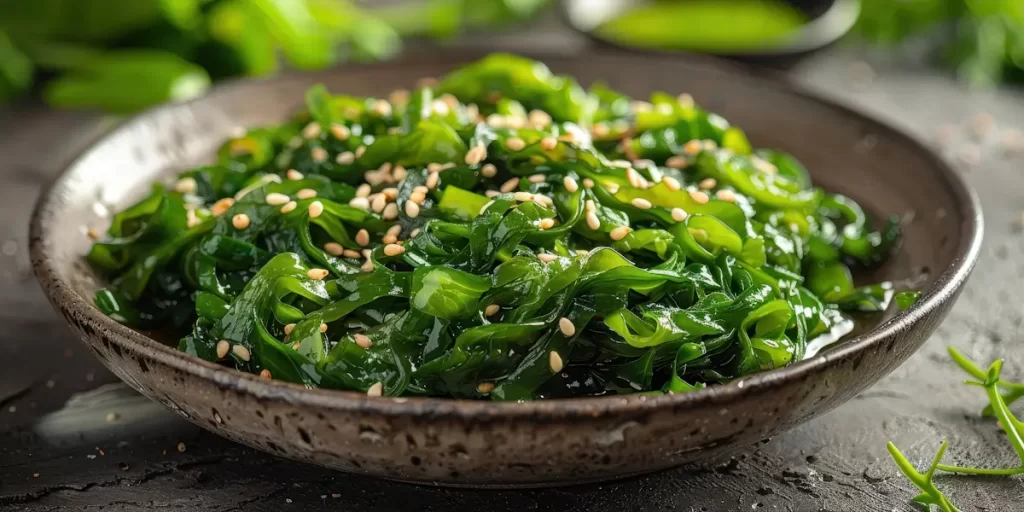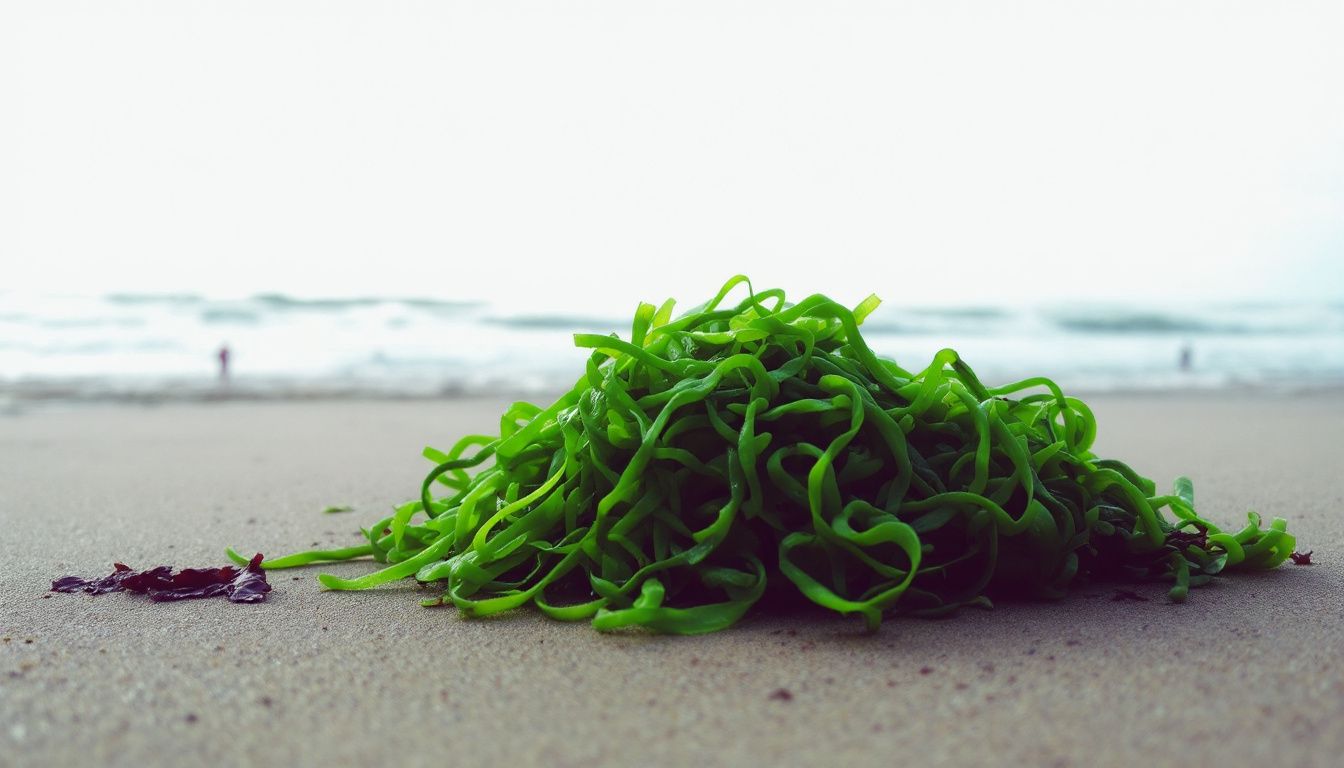Struggling to find a snack that’s tasty and healthy? Seaweed, a type of marine algae, might be the answer. Packed with vitamins, minerals like iodine, and fiber, it’s both nourishing and versatile.
Thank you for reading this post, don't forget to subscribe!Read on to discover how seaweed can boost your health!
Key Takeaways
- Seaweed is rich in vitamins like A, C, K, and B-complex (B2 and B12). It also contains minerals like iodine (73.5 mcg per 5g), calcium (22 mg), and iron (0.98 mg). These nutrients support vision, immunity, bone strength, and thyroid health.
- High in fiber (25-75%), seaweed promotes gut health by feeding good bacteria. Its prebiotics improve digestion, lower cholesterol, and balance blood sugar levels.
- Antioxidants like vitamin E and fucoxanthin protect cells from damage while reducing inflammation. These make seaweed great for boosting immunity.
- Low in calories but filling due to its soluble fibers, seaweed helps with weight management by curbing hunger and improving metabolism.
- Enjoy seaweed as roasted chips or add flakes to meals like soups or salads. It’s a versatile snack packed with omega-3s, antioxidants, and heart-friendly benefits!
Nutritional Benefits of Seaweed
Seaweed is packed with nutrients that support your body. It’s a natural food source full of vitamins, minerals, and healthy compounds to keep you energized.
High in vitamins and minerals
Packed with essential nutrients, seaweed is a powerhouse of vitamins and minerals. It contains Vitamin A for vision, Vitamin C to boost immunity, and Vitamin K to support blood clotting—one serving can provide up to 20% of your daily needs.
It’s also rich in B-complex vitamins like B2 and B12, which help your body break down food into energy.
Minerals such as calcium (22mg per 5g), iron (0.98mg), and iodine (73.5mcg) make it a great choice for bone health, fighting fatigue, and supporting thyroid function. Trace minerals like zinc, copper, magnesium, and selenium work together to improve skin health and strengthen your immune system…
all from just a small amount of this marine superfood!
“Small but mighty—seaweed packs more nutrition than many land vegetables.”
Rich in antioxidants and fiber
Seaweed is full of antioxidants like vitamin E and fucoxanthin. These nutrients help protect cells from damage and support immune function. Fucoxanthin, found in brown seaweed, may also reduce inflammation.
This makes it a strong addition to any healthy snack or meal.
It’s also high in fiber—making up 25-75% of its content, mostly as prebiotics. Just 5 grams of dried nori provides about 3 grams of dietary fiber. Fiber improves digestion, promotes gut health by feeding good bacteria, and helps maintain stable blood sugar levels.
Its high insoluble fiber aids heart health too by lowering total cholesterol….

Top Health Benefits of Seaweed
Seaweed offers great benefits for your body and overall well-being. It helps keep important systems in check, making it a smart choice for better health.
Supports thyroid function
Iodine helps the thyroid gland work properly. A small amount, like 5 grams of dried nori, gives about 73.5 mcg of iodine—important for making thyroid hormones. These hormones control metabolism and energy.
Too much iodine can harm thyroid health. The safe limit is less than 1,100 mcg daily. Too much may lead to an overactive or underactive thyroid gland, which affects the body’s balance.
Promotes gut health
Seaweed supports gut health with its high dietary fiber, ranging from 25-75%. Most of this fiber comes from polysaccharides, which act as prebiotics. These fibers are not digestible but feed good bacteria in your intestines.
This process strengthens the gut microbiome and helps with breaking down food.
Prebiotic fibers in seaweed also boost digestive health by improving insulin sensitivity and lowering cholesterol levels. They may even help the immune system work better. Eating sea vegetables like nori sheets or seaweed flakes can make a big difference in maintaining a balanced gut.
Aids in weight management
Seaweed is a low-calorie food with high nutritional value. Just two tablespoons of wakame contain only 5 calories and 1 gram of carbohydrates. Its soluble fibers help slow stomach emptying, keeping you full longer.
This helps reduce overeating and supports weight loss efforts.
It’s also rich in fiber, which promotes better digestion and gut health. A healthy gut can manage sugars more effectively. This boosts metabolism while aiding in weight management.
Eating seaweed as part of a balanced diet can be an easy way to stay on track without feeling deprived.

How to Enjoy Seaweed as a Snack
Seaweed can be a fun and tasty snack with plenty of variety to try. From crispy options to creative meal ideas, there’s something for everyone who loves salty, flavorful treats.
Seaweed chips and roasted sheets
Crunchy seaweed chips make a healthy, low-calorie food choice. These vegan snacks are gluten-free and packed with nutrients like iodine and vitamin C. Roasted sheets of nori offer an umami taste while providing essential minerals.
They are rich in dietary fiber, antioxidants, and heart-friendly omega-3 fatty acids.
To make them at home, bake nori sheets brushed with sesame oil and tamari at 300°F for 10–15 minutes. Add toppings like sesame seeds or garlic powder for extra flavor. These crispy treats work great as part of a plant-based diet or a quick snack on the go!
Incorporating seaweed into meals
Seaweed can add flavor and nutrition to any meal. It is low in calories but packed with vitamins, minerals, and fiber.
- Add seaweed flakes to soups or stews for extra nutrients like iodine and vitamin C. It also boosts the taste with its salty, umami flavor.
- Use roasted seaweed sheets as a wrap for rice, veggies, or protein. This works well for quick snacks or lunch options.
- Sprinkle seaweed into salads for more fiber and omega-3 fatty acids. Try wakame in a Japanese seaweed salad with sesame oil and ginger juice.
- Mix chopped edible seaweed into stir-fries for better texture and added folic acid. Korean dishes like miyeok guk often use dried, soaked seaweed this way.
- Blend powdered organic seaweed into smoothies for a unique twist loaded with antioxidants and insoluble fiber.
- Pair it with chickpeas or nuts in a savory dish to increase protein while keeping it vegetarian-friendly.
- Cook with undaria pinnatifida (wakame) instead of unhealthy foods high in fats—it’s versatile for nutrient-rich meals!
- Top sushi rolls or poke bowls with fresh marine algae to enjoy their heart health benefits while enhancing your food’s look.
- Combine small amounts of dried seaweed into baked goods like breadsticks—this adds iodine without altering taste much.
- Toss some shredded nori onto pasta or noodle dishes as a garnish rich in soluble fibers great for gut microbes!
Incorporating Seaweed into Healthy Eating Plans
Add seaweed flakes to soups, salads, or smoothies. These flakes boost flavor and provide essential nutrients like iodine and vitamin K. Roasted seaweed sheets make crunchy additions to wraps or rice bowls.
They are low-calorie foods that fit well in a healthy, balanced diet.
Use edible seaweeds as an alternative to salt in recipes. Their unique taste enhances dishes while promoting heart health and digestive health. Organic seaweed is safer from heavy metals, so check food products for quality labels.
Try adding marine algae to Japanese dishes for more omega-3 fatty acids and insoluble fiber.
Conclusion
Seaweed is a simple and tasty way to boost your health. It’s packed with vitamins, minerals, and fiber that support your body. Enjoy it as chips, flakes, or in meals—it fits many diets.
Just watch portion sizes for balanced iodine intake. Give seaweed a try today!
